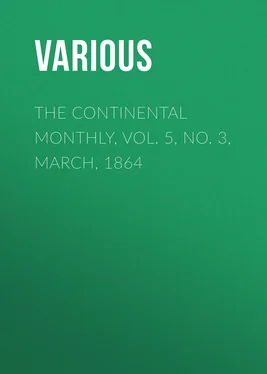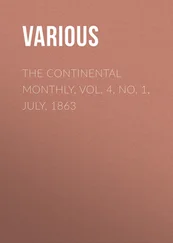Various - The Continental Monthly, Vol. 5, No. 3, March, 1864
Здесь есть возможность читать онлайн «Various - The Continental Monthly, Vol. 5, No. 3, March, 1864» — ознакомительный отрывок электронной книги совершенно бесплатно, а после прочтения отрывка купить полную версию. В некоторых случаях можно слушать аудио, скачать через торрент в формате fb2 и присутствует краткое содержание. Жанр: foreign_antique, periodic, Языкознание, Политика, foreign_edu, на английском языке. Описание произведения, (предисловие) а так же отзывы посетителей доступны на портале библиотеки ЛибКат.
- Название:The Continental Monthly, Vol. 5, No. 3, March, 1864
- Автор:
- Жанр:
- Год:неизвестен
- ISBN:нет данных
- Рейтинг книги:3 / 5. Голосов: 1
-
Избранное:Добавить в избранное
- Отзывы:
-
Ваша оценка:
- 60
- 1
- 2
- 3
- 4
- 5
The Continental Monthly, Vol. 5, No. 3, March, 1864: краткое содержание, описание и аннотация
Предлагаем к чтению аннотацию, описание, краткое содержание или предисловие (зависит от того, что написал сам автор книги «The Continental Monthly, Vol. 5, No. 3, March, 1864»). Если вы не нашли необходимую информацию о книге — напишите в комментариях, мы постараемся отыскать её.
The Continental Monthly, Vol. 5, No. 3, March, 1864 — читать онлайн ознакомительный отрывок
Ниже представлен текст книги, разбитый по страницам. Система сохранения места последней прочитанной страницы, позволяет с удобством читать онлайн бесплатно книгу «The Continental Monthly, Vol. 5, No. 3, March, 1864», без необходимости каждый раз заново искать на чём Вы остановились. Поставьте закладку, и сможете в любой момент перейти на страницу, на которой закончили чтение.
Интервал:
Закладка:
Various
The Continental Monthly, Vol. 5, No. 3, March, 1864 / Devoted to Literature and National Policy
AMERICAN FINANCES AND RESOURCES
LETTER NO. III. OF HON. ROBERT J. WALKER
It is generally believed, even when the American rebellion should be suppressed, that there would be a great loss of wealth and resources on the part of the United States. As an economical question the great truth is not disputed by me, that, as a general rule, wars by a waste of property, by large expenditures, and by the withdrawal of so much labor from the pursuits of industry, impair the material interests of the nation. The influence of such considerations in the United States is not denied; but there are in the cause of this contest, as well as in its effects and consequences, results which will more than compensate for such losses. Slavery was the sole cause of this rebellion, and the result will be the reconstruction of the Union, with slavery everywhere extinguished. On this assumption, the question is, whether the substitution of free for slave labor throughout every State and Territory of the Union will not, as a question of augmented wealth and invigorated industry, far more than compensate for the losses incurred in the contest. Reasoning inductively, it might well be supposed that the willing labor of educated and energetic freemen would be far more productive than the forced labor of ignorant, unwilling, and uneducated slaves. In the realm of science, as well as in the direction of labor, knowledge is power, education is wealth and progress; and that this is applicable to the masses who compose a community, and especially to the working classes, is demonstrated by our American official Census. In proof of this position, I will proceed by a reference to the official tables of our Census of 1860, to show not only in particular Slave States, as compared with other Free States, whether old or new, Eastern or Western, or making the comparison of the aggregate of all the Slave with the Free States, the annual product of the latter per capita is more than double that of the Slave States. I begin with Maryland as compared with Massachusetts, because Maryland, in proportion to her area, has greater natural advantages than any one of the Slave or Free States; and if the comparison with the Free States is most unfavorable to her, it will be more so as to any other Southern State; as the Census shows that, from 1790 to 1860, as well as from 1850 to 1860, Maryland increased in population per square mile more rapidly than any other slaveholding State.
We must consider the area, soil, climate, mines, hydraulic power, location, shore line, bays, sounds, and rivers, and such other causes as affect the advance of wealth and population.
The relative progress of Maryland has been slow indeed. The population of the Union, by the Census of 1790, was 3,929,827, of which Maryland, containing then 319,728, constituted a twelfth part (12.29). In 1860, the Union numbered 31,445,080, and Maryland 687,034, constituting a forty-fifth part (45.76). In 1790, the Free States numbered 1,968,455, Maryland's population then being equal to one sixth (6.12); but, in 1860, the population of the Free States was 18,920,078, Maryland's number then being equal to one twenty-seventh part (27.52). But, if Maryland had increased as rapidly from 1790 to 1860 as the whole Union, her proportion, one twelfth part, would have made her numbers in 1860, 2,620,315; and if her proportional increase had equalled that of the Free States, her ratio, one sixth, would have made her population in 1860, 3,153,392.
I take the areas from the report (November 29, 1860) of the Commissioner of the General Land Office, where they are for the first time accurately given, 'excluding the water surface.' The population is taken from the Census Tables. I compare first Massachusetts and Maryland, because they are maritime and old States, and both in 1790 had nearly the same population, but, as will be shown hereafter, with vastly superior natural advantages in favor of Maryland.
Area of Maryland, 11,124 square miles; shore lines, by tables of United States Coast Survey, viz.: main shore, including bays, sounds, etc., 503 miles, islands 298, rivers to head of tide water 535; total, 1,336 miles.
Area of Massachusetts, 7,800 square miles; shore lines, by tables of United States Coast Survey, viz.: main shore, including bays, sounds, etc., 435 miles, islands 259, rivers to head of tide water 70; total, 764 miles. When we mark the Potomac and its tributaries, the lower Susquehanna, the deep and numerous streams of the Chesapeake, the commercial advantages of Maryland over Massachusetts are vast indeed. Looking at the ocean shore of Maryland, and also at the Chesapeake Bay, the largest and finest estuary in the world, indented with numerous sounds and navigable inlets, three fourths of its length for both shores being within Maryland, and comparing this deep and tranquil and protected basin, almost one continuous harbor, with the rockbound coast of Massachusetts, lashed by the stormy Atlantic, the superiority of Maryland is striking.
Mortality in Maryland, by the late Census, viz., deaths from 1st June, 1859, to 31st May, 1860, 7,370 persons. Same time in Massachusetts, 21,303; making the ratio of deaths to the number living in Maryland, one to every 92, and in Massachusetts one to every 57; and the percentage of deaths in Maryland 1.09, and in Massachusetts 1.76. This rate of mortality for Massachusetts is confirmed by the late official report of their Secretary of State to the Legislature.
As to area, then, Maryland exceeds Massachusetts 43 per cent.; as to the shore line, that of Maryland is nearly double that of Massachusetts. As to climate, that of Maryland, we have seen, is far the most salubrious. This is a vast advantage, not only in augmented wealth and numbers, from fewer deaths, but also as attracting capital and immigration. This milder and more salubrious climate gives to Maryland longer periods for sowing, working, and harvesting crops, a more genial sun, larger products, and better and longer crop seasons, great advantages for stock, especially in winter, decreased consumption of fuel, a greater period for the use of hydraulic power, and of canals and navigable streams. The area of Maryland fit for profitable culture is more than double that of Massachusetts, the soil much more fertile, its mines of coal and iron, with the fluxes all adjacent, rich and inexhaustible; whereas Massachusetts has no coal, and no valuable mines of iron or fluxes. When we reflect that coal and iron are the great elements of modern progress, and build up mighty empires, this advantage of Maryland over Massachusetts is almost incalculable. The hydraulic power of Maryland also greatly exceeds that of Massachusetts. Such are the vast natural advantages of Maryland over Massachusetts. Now let us observe the results. Population of Maryland in 1790, 319,728; in 1860, 687,034; increase, 367,300. Population of Massachusetts in 1790, 378,717; in 1860, 1,231,065; increase, 852,348; difference of increase in favor of Massachusetts, 485,048; excess of Massachusetts over Maryland in 1790, 58,989, and in 1860, 544,031. This result is amazing, when we regard the far greater area of Maryland and her other vast natural advantages. The population of Maryland in 1790 was 28 to the square mile (28.74), and in 1860, 61 to the square mile (61.76); whereas Massachusetts had 48 to the square mile in 1790 (48.55), and 157 to the square mile in 1860 (157.82). Thus Massachusetts had only 20 more to the square mile in 1790, and 96 more to the square mile in 1860. But if the area of Maryland and Massachusetts had been reversed, Massachusetts with the area of Maryland, and the population of Massachusetts of 1860 to the square mile, would have numbered then 1,755,661, and Maryland with the area of Massachusetts, and the population of Maryland of 1860 to the square mile, would have had then a population of only 481,728 upon that basis, leaving Massachusetts in 1860, 1,273,393 more people than Maryland.
Читать дальшеИнтервал:
Закладка:
Похожие книги на «The Continental Monthly, Vol. 5, No. 3, March, 1864»
Представляем Вашему вниманию похожие книги на «The Continental Monthly, Vol. 5, No. 3, March, 1864» списком для выбора. Мы отобрали схожую по названию и смыслу литературу в надежде предоставить читателям больше вариантов отыскать новые, интересные, ещё непрочитанные произведения.
Обсуждение, отзывы о книге «The Continental Monthly, Vol. 5, No. 3, March, 1864» и просто собственные мнения читателей. Оставьте ваши комментарии, напишите, что Вы думаете о произведении, его смысле или главных героях. Укажите что конкретно понравилось, а что нет, и почему Вы так считаете.












